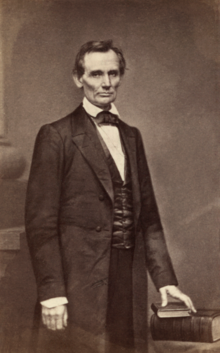
| ||
|---|---|---|
|
Personal
Political
16th President of the United States
First term
Second term
Presidential elections
Assassination and legacy
 |
||
The Cooper Union speech or address, known at the time as the Cooper Institute speech,[1] was delivered by Abraham Lincoln on February 27, 1860, at Cooper Union, in New York City. Lincoln was not yet the Republican nominee for the presidency, as the convention was scheduled for May. It is considered one of his most important speeches. Some historians have argued that the speech was responsible for his victory in the presidential election later that year.[2]
In the speech, Lincoln elaborated his views on slavery by affirming that he did not wish it to be expanded into the western territories and claiming that the Founding Fathers would agree with this position. The journalist Robert J. McNamara wrote, "Lincoln's Cooper Union speech was one of his longest, at more than 7,000 words. And it is not one of his speeches with passages that are often quoted. Yet, due to the careful research and Lincoln's forceful argument, it was stunningly effective."[3]
Horace Greeley's New York Tribune hailed it as "one of the most happiest and most convincing political arguments ever made in this City. ... No man ever made such an impression on his first appeal to a New-York audience."[4]
- ^ Barondess, Benjamin (1953). Lincoln's Cooper Institute Speech. The Civil War Round Table of New York, Inc. p. 6–7. LCCN 54001460.
His [Lincoln's] first stop was at Chicago. There, he went to visit his friends Joseph Medill and Charles Ray, publisher and editor-in-chief of the Chicago Tribune. On arrival in their office Lincoln produced the manuscript of his proposed speech, written on blue foolscap, and asked them for their comments on his phraseology and use of words.... Medill and Ray set to work on Lincoln's manuscript and kept at it for hours. They soon amassed a great number of proposed corrections.... When Lincoln arrived, they handed him a large batch of notes setting forth the corrections they recommended. He glanced through them hurriedly, expressed his thanks, told a few funny stories, and left for New York. After the Cooper Institute speech had been delivered, the New York newspapers arrived, with the text of the address, as delivered. Medill and Ray read it through carefully. When they had finished, Ray said: 'Medill, old Abe must have lost out of the car window all our precious notes, for I don't find a trace of one of them in his published talk here.' Medill replied: 'This must have been meant for one of his waggish jokes.'
- ^ Holzer, Harold. Lincoln at Cooper Union: The Speech That Made Abraham Lincoln President. p. 1. ISBN 0-7432-9964-7. Retrieved March 12, 2016.
[H]ad he not triumphed before the sophisticated and demanding audience he faced at New York's Cooper Union on February 27, 1860, Lincoln would never have been nominated, much less elected, to the presidency that November.
- ^ "Lincoln's Cooper Union Address Propelled Him to the White House. A Speaking Engagement in New York City Makes an Illinois Lawyer a Political Star". About.com (A part of The New York Times Company). Archived from the original on January 14, 2013. Retrieved February 24, 2011.
- ^ "New York Tribune". February 28, 1860.
© MMXXIII Rich X Search. We shall prevail. All rights reserved. Rich X Search

